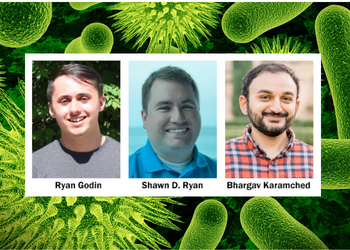CSU Undergrad Research Paper Explores Bacterial Collaboration, Represents 13th CSU undergraduate co-authored paper since 2017 from Ryan Research group
Former Cleveland State University undergraduate Chemistry major Ryan Godin (B.S., 2022) recently developed a research paper showcasing “a simplified model for a multi-strain bacteria consortium.” Godin’s paper was done in collaboration with Shawn Ryan, Ph.D., Biophysics, Mathematics and the Center for Applied Data Analysis and Modeling (ADAM) at CSU, and Bhargav Karamched, Ph.D., Mathematics, Biophysics & Neuroscience at Florida State University (FSU).
The paper represents the thirteenth CSU undergraduate student co-authored paper since 2017 from the Ryan Research group. Twelve of those manuscripts have had a CSU undergraduate as the first author, including this one.
In layman’s terms, when two or more different species of bacteria interact with one another “in the wild,” they secrete “cellular signals” to each other in their given habitat. Within that interaction, or “consortium,” one of them could produce a molecule that the other can pick up and use for an interactive purpose. This is useful as it is difficult and requires energy to make complicated molecules.
If one strain of bacteria can just make one type of molecule and then “trade” with other strains of bacteria (so to speak) for the other molecules it needs to perform a specific task, it will use less energy and be more efficient at accomplishing a task. Each species in the group would then do a small and simpler part of the task, rather than trying to make one species do the entire task.
Engineers can mix/modify 2 or more different bacteria to do some useful things—including the breaking down of environmental pollutants—creating what are commonly referred to as “co-cultures” or “consortia” (the plural of consortium, or a group of people or organizations working toward some common goal).
The technological development in and surrounding synthetic biology has been steadily increasing— particularly as researchers engineer biological systems like cells to carry out tasks that are difficult or impossible to achieve using traditional chemistry.
Personalized medicine, sustainable agriculture, and biomanufacturing are just some areas currently benefitting from these new techniques; given “the youth of the field” means that there is still room for significant innovations and improvements.
# # #
About Cleveland State University
Founded in 1964, Cleveland State University is a public research institution that provides a dynamic setting for Engaged Learning. With nearly 16,000 students, eight colleges and more than 175 academic programs, CSU was again chosen for 2022 as one of America’s best universities by U.S. News & World Report, including the #1 university in Ohio for social mobility. Find more information at www.csuohio.edu.

Original source can be found here.
 Alerts Sign-up
Alerts Sign-up